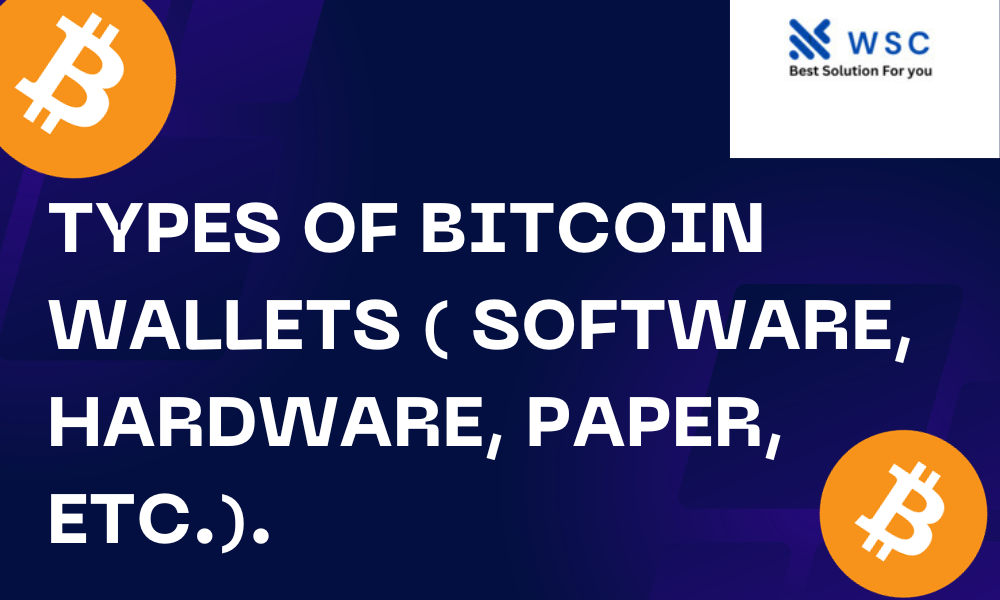Exploring the Spectrum: Types of Bitcoin Wallets (Software, Hardware, Paper, and More)
In the realm of cryptocurrency, Bitcoin reigns supreme. It’s not just about acquiring Bitcoins but also about safeguarding them securely. This is where Bitcoin wallets come into play, offering a range of options tailored to different needs and preferences. Let’s delve into the extensive landscape of Bitcoin wallets, spanning from software and hardware to paper wallets and beyond.
Types of Bitcoin Wallets (Software) – A Digital Haven for Your Assets
Software wallets, often referred to as digital wallets, are among the most commonly used types in the crypto domain. These wallets come in various forms, from desktop and mobile applications to online platforms and even browser extensions. They offer convenience, accessibility, and diverse functionalities tailored for both beginners and seasoned Bitcoin users.
Hardware Wallets – Fortresses for Your Digital Wealth
When security is paramount, hardware wallets emerge as the stalwarts of Bitcoin storage. These physical devices resemble USB drives and are designed to store Bitcoin keys offline, away from potential cyber threats. With their robust encryption and isolation from internet connections, hardware wallets offer unparalleled security for safeguarding your digital assets.
Paper Wallets – A Time-Tested Approach to Security
In a digital world, the concept of paper wallets might seem paradoxical, yet they remain an intriguing and secure option for storing Bitcoins. These wallets involve printing out Bitcoin keys and QR codes on paper, keeping them offline and safe from online vulnerabilities. Despite their simplicity, paper wallets necessitate cautious handling and safekeeping of the physical document.
Hybrid Wallets – Bridging Convenience and Security
Hybrid wallets amalgamate the advantages of both software and hardware wallets, offering a middle ground between accessibility and security. They usually connect to the internet for transactions while storing private keys offline, ensuring a balance between convenience and protection.
Multi-Signature Wallets – Reinforcing Security through Collaboration
Adding an extra layer of security, multi-signature wallets necessitate multiple signatures or approvals to execute Bitcoin transactions. This approach involves multiple private keys, often distributed among different individuals, ensuring enhanced security by requiring consensus for any outgoing transaction.
Mobile Wallets – Bitcoin at Your Fingertips
In an era dominated by smartphones, mobile wallets have gained immense popularity. These applications, tailored for mobile devices, allow users to manage their Bitcoin holdings on the go. They offer convenience without compromising security, provided users follow best practices for securing their devices.
Desktop Wallets – A Trusted Haven on Your Computer
Desktop wallets, installed on personal computers, provide users with control and accessibility over their Bitcoin holdings. While they offer security benefits by keeping keys offline, they are vulnerable to malware or hacking attempts if the device is compromised.
Conclusion: Navigating the Varied Landscape of Bitcoin Wallets
In the ever-evolving realm of cryptocurrencies, understanding the nuances of Bitcoin wallets is imperative for safeguarding your digital assets. Whether opting for the accessibility of software wallets, the robust security of hardware wallets, or the simplicity of paper wallets, each type caters to specific needs and preferences. As technology advances, the landscape of Bitcoin wallets continues to expand, offering users a diverse array of choices to secure their digital wealth. As you navigate this ecosystem, prioritize security, stay informed about best practices, and choose the wallet type that aligns with your unique requirements.
Check our tools website Word count
Check our tools website check More tutorial




